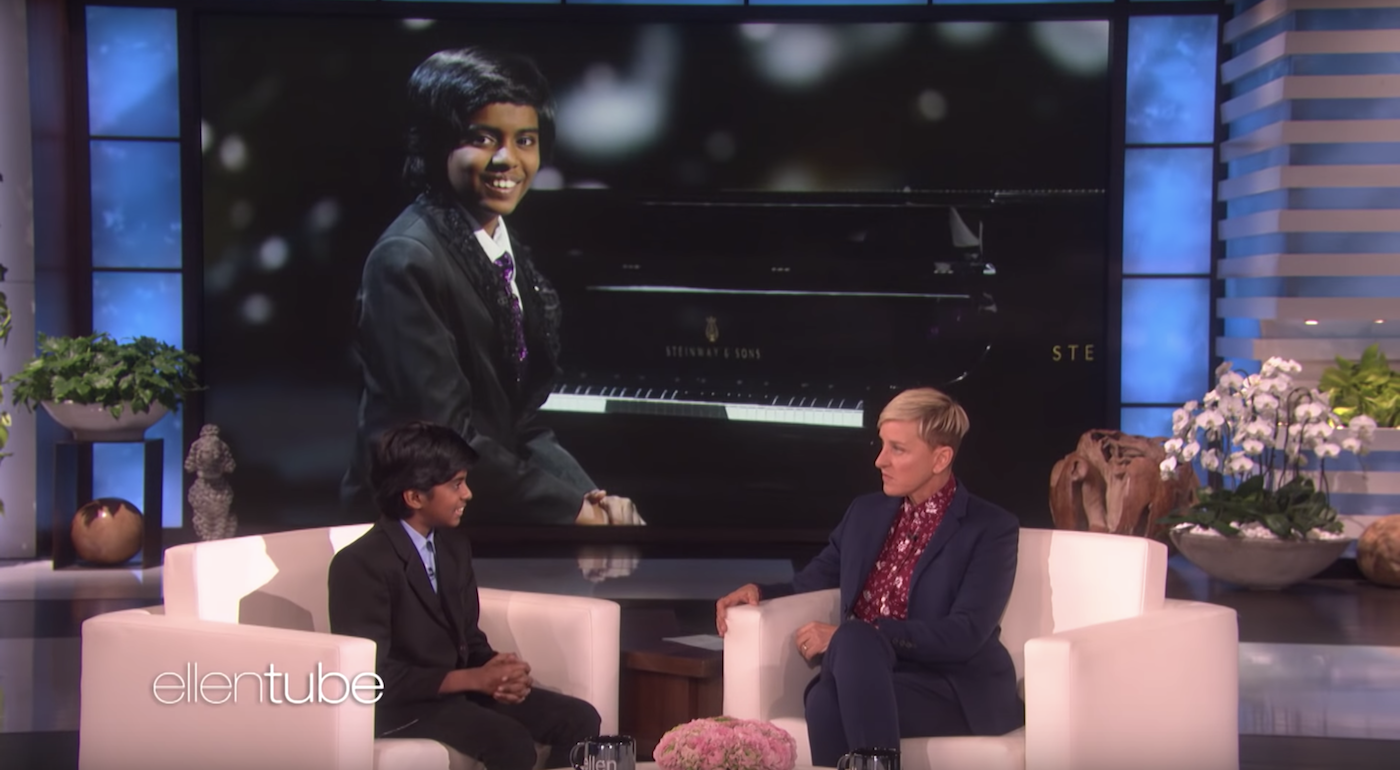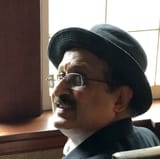LYDIAN NADHASWARAM: BEYOND THE BLINDFOLD

Lydian Nadhaswaram’s sterling performance in the audition round of The World’s Best (a talent show on the American television station, CBS) not only advanced him to the next round, but its video recording went viral on the Internet. He had played Rimsky-Korsakov’s The Flight of the Bumblebee at three tempos, the third (325 beats per minutes) twice as fast as the piece is usually played.
The Indian news media were awash with reports, and interviews with Lydian. Notable personalities such as AR Rahman, Anand Mahindra, Amitabh Bachchan, and Sushmita Sen took to social media to laud the prodigy. In addition, some foreign news media outlets like Russia’s Sputnik International News Agency and Britain’s Classical FM had write-ups. Lydian took the attention in stride, with his characteristic modesty and equanimity.
He opened his second appearance on The World’s Best with a sedate excerpt from Chopin’s Fantaisie Impromptu, but this appearance will probably be most remembered for his blindfold rendition of Mozart’s Rondo Alla Turca (Turkish March). It can be viewed in a version edited by CBS in the video below.
Lydian has previously played the piano blindfolded in public. A few videos of his blindfold performances are available on YouTube. He has his share of sceptics who question whether the blindfold is contrived, whether he can see through it. When I asked him what he made of such views, he just gave a dismissive shrug. It reminded me of lines from a song from Amar Prem, an old Hindi film: “Kuchh to log kahenge. Logon ka kaam hai kehna.” (“People will gossip, for they are obsessed with it.”)
Nevertheless, aware that there are Doubting Thomases out there, Lydian asked the show’s host, James Corden, to don the blindfold and vouch to the audience that he could not see through it. CBS had modified a standard blindfold with layers of opaque black cloth and tested it to ensure it was foolproof. But the audience could not know that, so getting Corden’s endorsement was smart.
Lydian Nadhaswaram’s performance in the Battle Round of The World’s Best
After the performance, American judge Drew Barrymore commented, “You’re showing more tricks in your bags rather than gimmicks. And I know everyone will say ‘Oh, you played so fast and now you’re playing blindfolded.’ I think you’re also making it fun for the other people watching, especially kids. Like – look at what you can do. You’re incredible.”
And then Barrymore found out just how incredible Lydian was. He took her back through time through music, playing the theme from the film E.T. Barrymore was a child actor in that movie; it launched her acting career. A deeply touched Barrymore came onstage to give Lydian a hug; Corden informed her that Lydian had learnt that piece of music only the day before.
How that happened makes for an interesting story. Lydian had looked up the profiles of the American judges and discovered Barrymore’s E.T. connection. The day before the show, while he was in the taxi on the short ride from his hotel to the CBS studio, he listened to a recording of the E.T. theme on his phone. By the time he reached the studio, he had memorized it. Like Mozart, he has the gift of musical memory (the ability to memorize long sequences of notes) and often reproduces tunes after a single hearing. Lydian had not planned to play this music onstage but Corden got wind of it and remarked to Lydian, “A little birdie told me that you have actually prepared something for Drew,” before asking him to play it.
It wasn’t only Indian celebrities who noticed Lydian. His Bumblebee video got the attention of Ellen DeGeneres, arguably the most popular daytime television talk show host in America today. She invited Lydian to The Ellen Show. “It was the best interview,” Lydian said. “Ellen was nice, kind – and very playful.”
Ellen DeGeneres interviews Lydian Nadhaswaram; reprise of Mozart’s Turkish March with blindfold
When Ellen asked Lydian to perform with a blindfold, he once more chose Mozart’s Rondo Alla Turca, which you can hear unabbreviated in the video above. The composition has sentimental value for Lydian. It was the first piano piece that he learnt. His sister Amirthavarshini was studying piano; Turkish March was one of her pieces. Lydian listened carefully and after she was done, he reproduced the notes on the piano correctly. He had already a reputation as a child prodigy drummer; this was his first signal to his family and, by extension, to the world that he was going to do a thing or two on the piano as well.
Many in the music profession frown on blindfolded acts, considering them befitting of entertainers rather than professional musicians. Mozart gave blindfolded performances as a child prodigy and was taken on extensive tours of Europe by his father Leopold to perform in palaces and taverns alike. Regarding Leopold’s reputation for being domineering, Marcia Davenport writes in her biography Mozart:
“…they [musicians] were servants of courts, in station little above menials, in practice never above turning their talents into bread. Fame was their first requisite, for they depended utterly on their reputations to obtain situations. If Wolfgang was ever to reach the highest position in the service of some royalty, he could not begin too soon to acquire fame.”
However, in his teenage years and early adulthood, Mozart was shunned in influential music circles because of the impression that he was too flashy, too eager to pander to the hoi polloi, and perhaps a little arrogant. The shunning continued despite Mozart’s writing some of the loveliest music there was. It took a few years of struggle before acknowledgement spread that the former boy wonder was now an amazing musician.
Lydian’s discovery that he could play blindfold was fortuitous. He was clowning around with his sister one day when she playfully wrapped a towel around his face and asked him to play The Mad Professor, a piano beginner’s piece. Lydian stunned her (and himself) by playing, not The Mad Professor, but The Flight of the Bumblebee. He was only eight.
You have seen Lydian Nadhaswaram play it fast – now watch him play it blindfolded.
I asked Lydian if there was any method he used while playing blindfold. There was nothing specific, he said. He took a good look at the keyboard including the location of the first key to be played before he slipped on the blindfold, hummed the first note and played the key – and took it from there till the end. “What is needed is the confidence,” he asserts.
The neuroscience of music is an extremely complex subject. The sound of music with all its nuances is perceived and stored by the auditory cortex of the brain. To play this music, the information is transmitted to the motor cortex, which initiates the necessary voluntary movements of the arms, fingers, cheeks, or whatever that particular musical instrument requires. An accomplished performance is achieved by more than just the brain. There is also muscle memory – the ability to repeat a specific muscular movement with improved efficiency and accuracy that is acquired through practice and repetition. A study with pianists as subjects showed that the region of the motor cortex that controls the piano-playing fingers expanded rapidly the more the pianists played. This is why music educators say that the key to the mastery of music is practice, practice, and practice. There are no shortcuts.
But not every pianist who is practice-perfect and has a piece of music down pat can play it blindfolded. The keystone of the effort, as Lydian put it, is confidence – the unflagging conviction that one can do it. All of this is lost on the number of people who left comments on social media to the effect that what Lydian did was not much of a deal. Shallow armchair critics do not understand what it takes, and how fit Lydian is for his age: physically, mentally, and emotionally.
Lydian explained that his father Varshan Sathish would carefully choose the occasions where Lydian would wear a blindfold. He explained that his father would make the call depending on various factors such as the ambience and his (the father’s) judgement of what that particular audience was like. But in time, this ability of Lydian’s became widely known and organizers of shows would insist on a blindfold performance. In quite a few cases, it was difficult to turn them down. And on a reality show like The World’s Best which relies on high drama and on The Ellen Show, something of this nature might have even been expected.
The downside is that viewers become so fixated by the blindfold that they pay less attention to the music than they should. Many comments on these two videos of Lydian on the Internet (The World’s Best and Ellen videos) reflect this. The standout comment on Twitter on Lydian’s Turkish March recital on The Ellen Show was by a viewer, Vic Thom, who tweeted: “As many times that I have heard this piece played, this young man’s was the first time ever that I was able to clearly hear all the melodies and counter melodies at the same time…An outstanding performance and incredible young man.”
As many times that I have heard this piece played, this young man's, was the first time ever, that I was able to clearly hear all the melodies and counter melodies at the same time… An outstanding performance and incredible young man.
— Vic Thom (@VictorT84264773) February 28, 2019
In other words, Vic Thom went beyond the blindfold and recognized Lydian’s musicianship for the gem that it is.
Lydian says of Mozart “His compositions are so beautiful – the arrangements, the tunes. He started composing from such a young age. I feel sad that he died so young [at age 35]. Just imagine what music we might have had if he had lived longer.” Lydian also shares many things with the young Mozart, musically (such as perfect pitch, the ability to play blindfolded, be the master of multiple instruments, and the knack of improvising) and personally (an elder sister who is a musician in her own right and a father who made tremendous sacrifices in his own career for the sake of his children). Unlike the boy Mozart, Lydian does not display his other abilities such as perfect pitch on stage.
As Mozart discovered, the blindfold’s novelty wears off soon. Perhaps those who are really distracted by Lydian’s blindfold should enjoy it while it lasts ─ and look beyond the blindfold at all his musical abilities. And consider this: Ray Charles, the famous blues and jazz pianist and singer, played the piano with poise all his life and never used a blindfold. He was blind. His lack of eyesight may have surprised some when they first learned about it but in time it became non-consequential, and his music became all.






